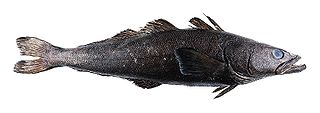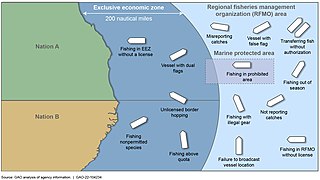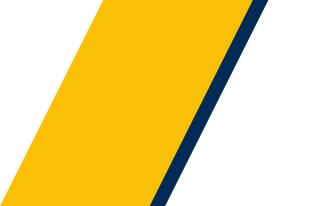
The Patagonian toothfish, also known as Chilean sea bass, mero, and icefish, is a species of notothen found in cold waters between depths of 45 and 3,850 m in the southern Atlantic, Pacific, and Indian Oceans and Southern Ocean on seamounts and continental shelves around most Subantarctic islands.

The Canadian Coast Guard is the coast guard of Canada. Formed in 1962, the coast guard is tasked with marine search and rescue (SAR), communication, navigation, and transportation issues in Canadian waters, such as navigation aids and icebreaking, marine pollution response, and support for other Canadian government initiatives. The Coast Guard operates 119 vessels of varying sizes and 23 helicopters, along with a variety of smaller craft. The CCG is headquartered in Ottawa, Ontario, and is a special operating agency within Fisheries and Oceans Canada.

The Lockheed CP-140 Aurora is a maritime patrol aircraft operated by the Royal Canadian Air Force. The aircraft is based on the Lockheed P-3 Orion airframe, but mounts the electronics suite of the Lockheed S-3 Viking. "Aurora" refers to the Roman goddess of dawn who flies across the sky each morning ahead of the sun. Aurora also refers to the Aurora Borealis, the "northern lights", that are prominent over northern Canada and the Arctic Ocean.
Fisheries and Oceans Canada is a department of the Government of Canada that is responsible for developing and implementing policies and programs in support of Canada's economic, ecological and scientific interests in oceans and inland waters. Its mandate includes responsibility for the conservation and sustainable use of Canada's fisheries resources while continuing to provide safe, effective and environmentally sound marine services that are responsive to the needs of Canadians in a global economy.

The Turbot War was an international fishing dispute and bloodless conflict between Canada and Spain and their respective supporters.

Drift netting is a fishing technique where nets, called drift nets, hang vertically in the water column without being anchored to the bottom. The nets are kept vertical in the water by floats attached to a rope along the top of the net and weights attached to another rope along the bottom of the net. Drift nets generally rely on the entanglement properties of loosely affixed netting. Folds of loose netting, much like a window drapery, snag on a fish's tail and fins and wrap the fish up in loose netting as it struggles to escape. However, the nets can also function as gill nets if fish are captured when their gills get stuck in the net. The size of the mesh varies depending on the fish being targeted. These nets usually target schools of pelagic fish.

Unsustainable fishing methods refers to the use of various fishing methods to capture or harvest fish at a rate that is unsustainable for fish populations. These methods facilitate destructive fishing practices that damage ocean ecosystems, resulting in overfishing.

Illegal, unreported and unregulated fishing (IUU) is an issue around the world. Fishing industry observers believe IUU occurs in most fisheries, and accounts for up to 30% of total catches in some important fisheries.

Vessel Monitoring Systems (VMS) is a general term to describe systems that are used in commercial fishing to allow environmental and fisheries regulatory organizations to track and monitor the activities of fishing vessels. They are a key part of monitoring control and surveillance (MCS) programs at national and international levels. VMS may be used to monitor vessels in the territorial waters of a country or a subdivision of a country, or in the Exclusive Economic Zones (EEZ) that extend 200 nautical miles (370.4 km) from the coasts of many countries. VMS systems are used to improve the management and sustainability of the marine environment, through ensuring proper fishing practices and the prevention of illegal fishing, and thus protect and enhance the livelihoods of fishermen.

Canada's fishing industry is a key contributor to the success of the Canadian economy. In 2018, Canada's fishing industry was worth $36.1 billion in fish and seafood products and employed approximately 300,000 people. Aquaculture, which is the farming of fish, shellfish, and aquatic plants in fresh or salt water, is the fastest growing food production activity in the world and a growing sector in Canada. In 2015, aquaculture generated over $1 billion in GDP and close to $3 billion in total economic activity. The Department Of Fisheries and Oceans (DFO) oversees the management of Canada's aquatic resources and works with fishermen across the country to ensure the sustainability of Canada's oceans and in-land fisheries.
The North Pacific Anadromous Fish Commission (NPAFC) is an international, inter-governmental organization dedicated to the conservation of anadromous fish stocks in international waters of the North Pacific Ocean and its adjacent seas. It was established on 11 February 1992 by the Convention for the Conservation of Anadromous Stocks in the North Pacific Ocean and originally consisted of four member nations: Canada, Japan, Russian Federation, and United States of America. On 27 May 2003, the Republic of Korea acceded to the Convention bringing the current number of Commission members to five. The primary objective of the Commission is to provide a mechanism for international cooperation promoting the conservation of anadromous stocks in the NPAFC Convention Area of the North Pacific Ocean.
The Wellington Convention is a 1989 multilateral treaty whereby states agreed to prohibit the use of fishing driftnets longer than 2.5 kilometres in the South Pacific. The Wellington Convention played a role in the 1991 United Nations General Assembly's resolution calling for a global moratorium of driftnet fishing on the high seas.
Operation Caribbe is the Canadian Armed Forces contribution to the elimination of illegal trafficking in the Caribbean Sea and the eastern Pacific Ocean by organized crime. The operation began in 2006 and its mandate has been altered twice since then. It operates as part of Operation Martillo.
The Pacific Islands Forum's Forum Fisheries Agency maintains a Regional Fisheries Surveillance Centre in Honiara, Solomon Islands. In 1982, the United Nations Convention on the Law of the Sea gave all maritime nations, including the smaller Pacific Ocean nations, 200-nautical miles Exclusive Economic Zones (EEZ). Monitoring their EEZs is a challenge for some of the smaller nations, where their maritime zones dwarf their landmass, making cooperation essential.

The Directorate General of Marine and Fisheries Resources Surveillance is a government agency under the management of the Ministry of Marine Affairs and Fisheries of Indonesia. Formally established on 23 November 2000 according to Presidential Decree No. 165/2000, the PSDKP is the agency responsible for supervising the marine and fishery resources of the Republic of Indonesia. The main mission of PSDKP is the prevention of Illegal, unreported and unregulated fishing in Indonesian waters, which has caused a substantial loss for Indonesia's fishing industry. In its mission to prevent illegal fishing, PSDKP has conducted joint-operations with the Indonesian Navy, Water Police, Sea and Coast Guard, the Maritime Security Agency and Customs. PSDKP is however is not associated with these agencies.

RMIS Lomor (03) is a Pacific Forum-class patrol boat operated by the Republic of Marshall Islands Sea Patrol. Lomor is one of twenty-two small patrol vessels Australia designed and built for smaller fellow members of the Pacific Forum, after the United Nations Convention on the Law of the Sea extended a 200-kilometre (108 nmi) exclusive economic zone for all maritime nations.
Illegal, Unreported and Unregulated fishing (IUU) in the Arctic is an under researched scientific field. The most recent academic articles about IUU in the Arctic mainly concerns the mid-2000s.
Transshipment or transhipment at sea is done by transferring goods such as cargo, personnel, and equipment from one ship to another. It is a common practice in global fisheries and typically takes place between smaller fishing vessels and large specialized refrigerated transport vessels, also referred to as “reefers” that onload catch and deliver supplies if necessary.

RKS Teanoai (301) was a Pacific Forum-class patrol boat operated by the Republic of Kiribati Police. Teanoai was one of twenty-two small patrol vessels Australia designed and built for smaller fellow members of the Pacific Forum, after the United Nations Convention on the Law of the Sea extended control of a 200-kilometre (108 nmi) exclusive economic zone for all maritime nations.











